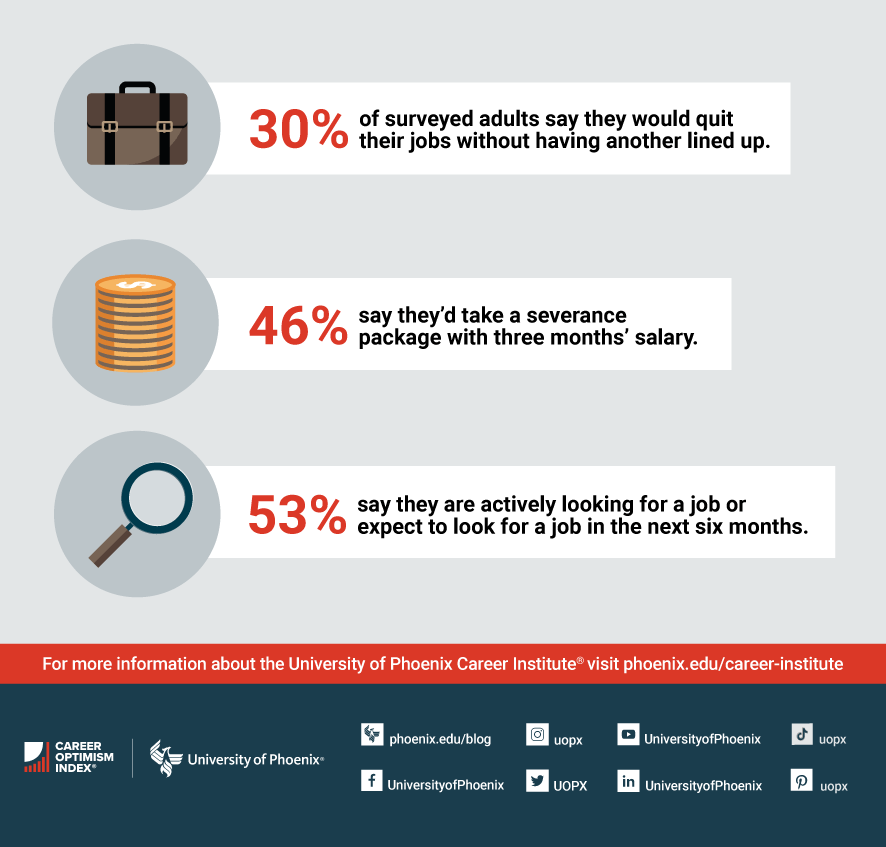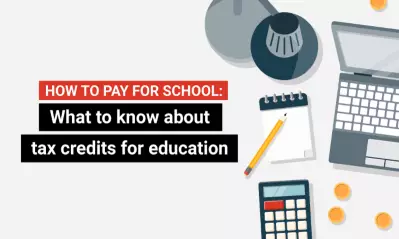Welcome to the free-agent labor market

At a glance
- A free-agent labor market is one in which employees feel confident enough in available opportunities to seek employment on their terms.
- The University of Phoenix Career Institute® recently released the 2023 Career Optimism Index®, which reveals how employers can benefit within a free-agent labor market.
- Employers can improve employee retention within a free-agent talent market by investing in upskilling and creating new opportunities for workers.
- Learn more about the Career Institute and how it’s working to eliminate barriers to career advancement.
When it comes to understanding the post-pandemic job market, you could be forgiven for comparing it to the Wild West. There were the heady days of remote work, the wakeup call of job-offer rescindment and the somewhat troubling trend of quiet quitting. There have been “boomerang employees” (those who left one job for greener pastures only to soon return) and more articles than you can count on what it all means.
But, as Raghu Krishnaiah observes, “Data is the ultimate equalizer.”

As the chief operating officer of University of Phoenix (UOPX), Krishnaiah has perhaps a more intense affinity for data than most. It’s what drives business decisions at all levels of the University, after all. But he also understands how it can be used to eliminate noise and reach a valuable insight.
Case in point is the 2023 Career Optimism Index, which looked at data from 5,000 U.S. adults and 500 employers who spoke about their level of career optimism amid varying workplace, economic and societal trends. As the results reveal, a free-agent labor market is here — and if employers play their cards right, that reality has the potential to be mutually beneficial.
Sign up for our LinkedIn® newsletter to receive career planning tips, resumé help and more. Subscribe here!
What is a free-agent labor market?
A free-agent labor market is one in which workers feel confident about available opportunities and will pursue them, even if those opportunities lie outside their current company.
“I think historically a free-agent labor market had to do a lot with the gig economy and people wanting to work on their own schedule, their own time, their own pace and so forth,” Krishnaiah observes.
Corporations predictably take a dim view of this setup. For them, retaining and attracting strong employees gets tough when workers would prefer to move from opportunity to opportunity rather than buckle down at one company for the long haul.
Krishnaiah likens this kind of market to when professional athletes “trade up” for higher salaries. “That’s exactly what’s happening,” he says. “Individuals are moving on to the next place. … But I think that both sides are still not fully accepting what that means. And they’re using it in their own interest as opposed to a collective interest.”
There are many potential reasons for this current phenomenon, including inflation, the pandemic and the rise of remote work. But Krishnaiah points to demographics as a major factor many people don’t fully appreciate.
“We’re nearly to the point where more workers are leaving the workforce than entering, and I estimate we’ll be like that for the next 10 to 15 years,” he says. “That results in labor shortages.”
And that results in an employee-driven job market.
What the Career Optimism Index reveals
The 2023 Career Optimism Index, which is the third such study conducted by UOPX’s Career Institute, seeks to acquire a solid assessment of the current employment landscape from both employer and employee perspectives.
“I was really focused a lot on the employer–employee relationship,” Krishnaiah says of his involvement. “How do you take your existing employee base and create a theoretical free-agency type of model without all the negative downside implications?”
To answer that question, Krishnaiah has plenty of, you guessed it, data. For example:

These statistics point to a key takeaway from the Career Optimism Index: Workers are open to pursuing new opportunities, and this free-agent mentality is what makes them so optimistic about the future of their careers.
What a free-agent labor market looks like
To understand what a free-agent labor market encompasses, it helps to get a clear idea of the pros and cons for both employers and employees.
Employee pros
- Can earn more by pursuing jobs with better salaries.
- Can quickly and fluidly align skills and interests with the right opportunities.
Employee cons
- Instead of feeling valued and encouraged to grow professionally, you’re viewed as an expendable resource.
- A high degree of uncertainty can lead to reduced productivity. “Stock markets are a great example of that,” Krishnaiah says. “If you’ve got a highly uncertain marketplace, guess what? Stock values plummet even if you have a highly stable business.”
Employer pros
- Hiring independent contractors can save overhead expenses.
- Employers can tailor hiring to candidates who have the skills employers need in the moment.
Employer cons
- Hiring and firing employees can get expensive, which can offset the overhead savings of long-term employees.
- With a rotating selection of independent contractors or employees, companies never build a strong knowledge base.
- Companies can only pay so much. Knowing that employees may well move up and on for better salaries, employers may assume an attitude of employee expendability, which becomes a “self-fulfilling negative spiral,” Krishnaiah says.
- That high degree of uncertainty leads to reduced productivity. “That’s a massive negative that we have to think about,” Krishnaiah says. “Is it really worth the squeeze to go and say we’re all going to be free agents versus finding a different way of operating going forward?”
Changing the free-agent conversation
One benefit of the Career Optimism Index is that it expands the conversation about the free-agent labor market. Yes, salary matters, but it turns out skills do too.
In fact, of the workers who were looking for a new job or expecting to do so in the next six months, 68% would be more likely to stay where they were if their current employers did more to upskill them. And 70% of all workers would be more likely to stay at a company throughout their career if they had more opportunities to apply new skills.
Krishnaiah explains: “It’s a matter of, how do individuals start recognizing that you have to constantly learn and develop … and how do employers ensure that people who are the strongest take those opportunities, engage in them early and are able to see the benefits of their efforts more quickly?”
Turning challenges into opportunity
One way to bring employers and employees together in this kind of climate is outlined in the Career Optimism Index. Specifically, employers can provide:
- Skilling
- Career pathing
- Workplace mentorship
Krishnaiah also points out the need for revisiting “legacy mechanisms” at companies with regard to salary. In other words, if an employee is going to invest in learning more or acquiring a new skill, there has to be a compensation change that would make it worthwhile.
Employees, meanwhile, need to take ownership of their skill development. That means outlining for your manager how you want to grow as a professional and working together to identify opportunities.
Krishnaiah has seen the benefits of such investment in his own seven-and-a-half-year tenure at UOPX. His data analytics team was developed internally over several years, and the payoffs are manifold, he says. His team has a bigger shared knowledge base, which benefits the company, and they have had the chance to grow in their roles, which benefits the employees.
In the end, it’s all about finding a win-win situation. “I don’t think this free-agent labor market is going to go away,” Krishnaiah says. “We need to figure out how to make it work for us, not against us.”
ABOUT THE AUTHOR
Elizabeth Exline has been telling stories ever since she won a writing contest in third grade. She's covered design and architecture, travel, parenting, lifestyle content and a host of other topics for national, regional, local and brand publications. Additionally, she's worked in content development for Marriott International and manuscript development for a variety of authors. Today, if given a free hour and the choice, she'd still prefer to curl up with a good story.
want to read more like this?
How Repaying Your Student Loans Can Impact Your Finances
Tuition and Financial Aid
April 28, 2023 • 7 minutes




